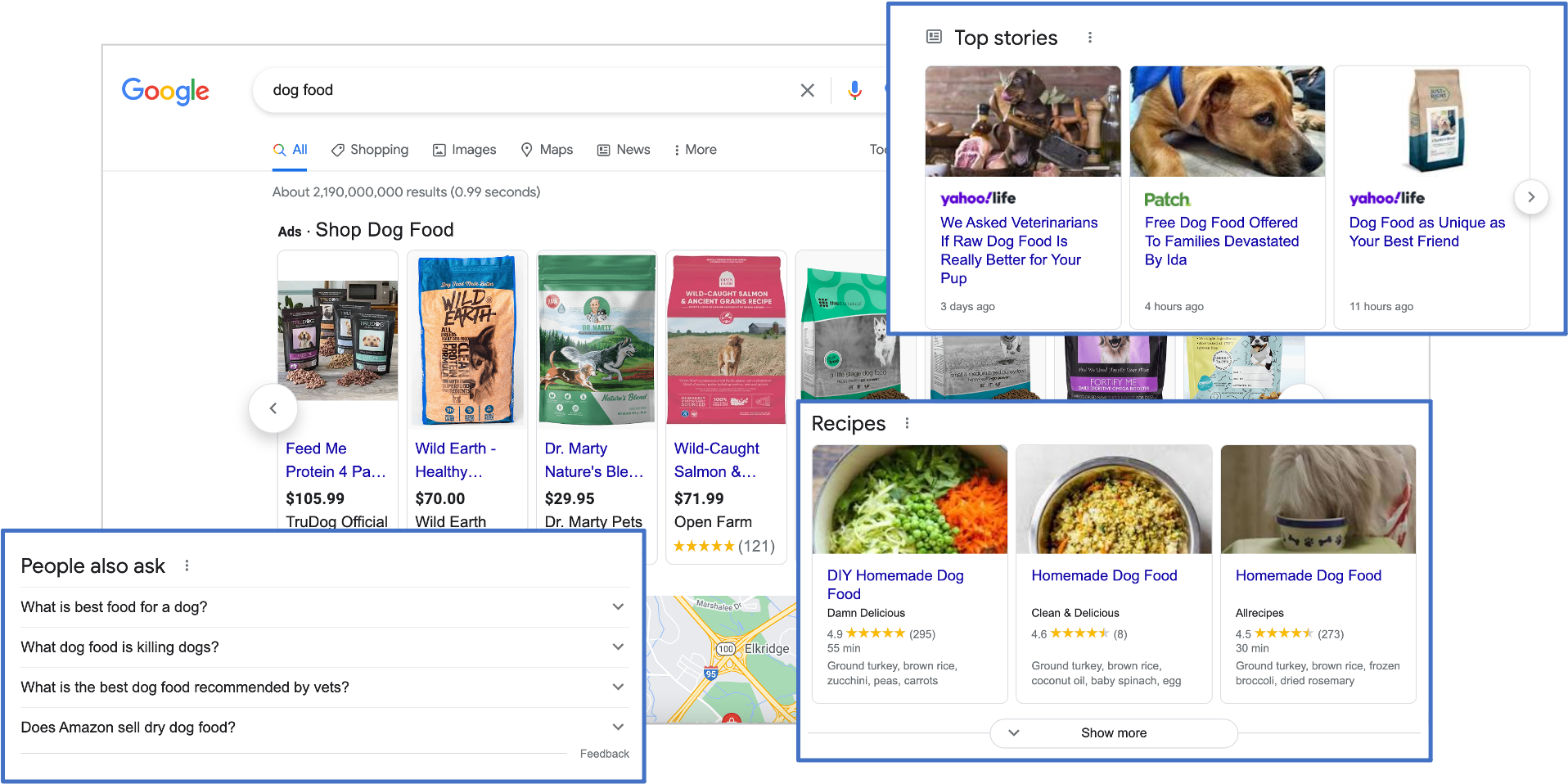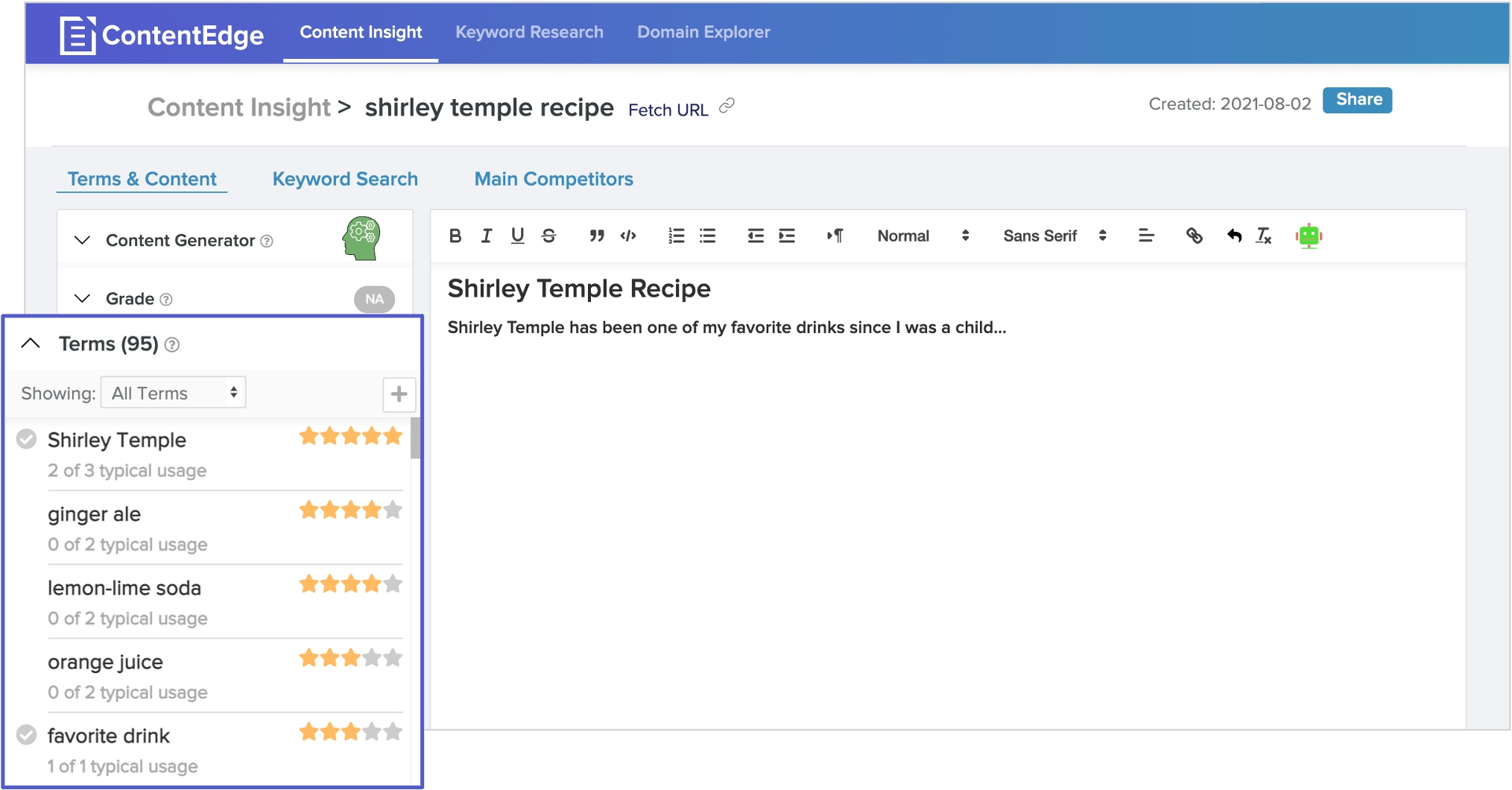Every year, Google gets one year wiser—and today, it’s smarter than it has ever been before.
The search engine is now able to distinguish between pages that are genuinely helpful and those that fill up space with gibberish, and looks at content relevance to determine whether your site is worthy of first-page status.
As you create content for your site, it’s important to know how content relevance comes into play. Keep reading for a breakdown of what this metric means and how to optimize your site with relevant content.
What is content relevance?
Put simply, content relevance refers to how well your page matches a user’s search intent and query. To determine relevance, Google looks at your page as a whole. It studies your keywords, alt text, and other on-page signals to understand the entire context of your page.
Relevant content ultimately serves to prove two things:
- That you’re a topical authority in your customer’s and Google’s eyes
- That your content fully and accurately addresses the query entered into Google
Signals for determining content relevance
Among the hundreds of signals that Google uses to rank a page, the below signals are reflective of content relevancy:
- Body text – Your target keywords in conjunction with the words surrounding it
- Media – Any images, charts, and/or video you include to illustrate your point
- Meta tags – Meta descriptions, title tags, alt text, and other elements that reinforce the purpose of your page
- Bylines – Related to Google’s E-A-T criteria, which checks that your authors are reputable experts in your space
You’ll want to make sure that each of these factors are properly accounted for and aligned with your main topic. While Google doesn’t disclose its exact formula for evaluating pages, these are likely part of the criteria used to assess relevance.
5 steps for creating relevant content
Given the above, there are several ways to guide your team down the right path. Heed these tips to learn how to adapt to the mindset of your customers and produce content that meets their expectations.
1. Pick topics that matter to your customers
The best content is focused. It doesn’t try to appeal to every type of consumer that you could possibly think of. Rather, it aims to satiate the curiosity of a specific reader—or a buyer persona, as many marketers would say.
One of the fastest (and most powerful ways) of identifying topics that are relevant to your readers is by talking to your existing customers. What questions do they have about your product or industry? What do they value? What are their day-to-day lifestyles like—and where does your brand come into play?
Chances are that what matters to them also matters to your prospects. By addressing their current-day questions or concerns, you can naturally create content that your prospects care about. Best of all, the closer you are to the source, the easier time you’ll have in understanding the complexities of a topic. Instead of winding up with high-level, generic content, you could create in-depth articles that fully address the topic at hand.
2. Analyze search intent
Keyword research is an essential part of any content operation. But one bad habit that marketers have is assuming that a keyword means exactly what they think it means.
In reality, there may be tons of times when a keyword doesn’t attract the crowd that you thought it did. For example, a quick Google search for “dog food” reveals a mix of product listings, news stories, and recipes to choose from.
If you were to target “dog food” as a main keyword, you’d be casting a wide net and potentially engaging people who have zero interest in purchasing dog food. Some may simply be researching what goes into dog food, while others may be looking to uncover nutrition facts about their pet’s meals.

While part of your strategy may include engaging people at various stages of the discovery funnel, you’ll want to know search intent ahead of time instead of getting surprised by it after. Understand when a keyword is navigational versus transactional versus informational. Anticipate what your readers’ end goal is before you write and verify this by investigating the current first-page winners of any keyword you’re interested in targeting.
Needless to say that you need to know user intent before you can create relevant content. Otherwise, you’re just shooting a dart with one eye closed hoping that it lands on a bullseye.
3. Include associated words and phrases on your page
Aside from detecting exact match keywords on your page, Google will pick up on semantically related terms. For instance, if you’re writing about Shirley Temple, Google will notice that you’re using the words “recipe,” “ginger ale,” and “soda” in conjunction with “Shirley Temple.” This will signal to the search engine that you’re speaking about the drink, not the actress, and help it to rank your page accordingly.
Along the same lines, the best way to prove your content relevance is by speaking naturally and expertly about your topic. Google recognizes patterns and relationships between billions of words. So, to demonstrate relevance, you need to speak in the language of your readers.
To learn what words Google is expecting to see, you can use ContentEdge’s Content Insight tool, which shows a list of words that frequently appear within high-ranking results of a keyword. It’ll show you how often a keyword tends to appear within an article and how much weight Google puts on it.

Try out ContentEdge for free here
4. Optimize your title tags and meta descriptions
Meta tags are too often underutilized in SEO, if only because they’re misunderstood. Some marketers will only touch their meta titles and descriptions when they have spare time—failing to recognize that even though your meta tags don’t directly boost SEO, they can impact your click-through rate (CTR), which is important to Google’s ranking algorithm.
Moreover, in the context of content relevance, your titles and descriptions give your readers their first impression of your page. They may be the first things that they read before clicking on your URL, serving as the basis for what they expect to see in the rest of your article.
For this reason, you’ll want to make sure that your title tags and meta descriptions are carefully written. They should accurately describe what your visitors should expect to find, and appeal to your customers’ search intent. For example, let’s say that a user googles for “best dog food for puppies.”
The below result is well-optimized for both the keyword and user intent, mentioning how Hill’s Puppy is a classic growth formula for dogs and safe for all puppies.

The copy resonates with the values and concerns of the reader, compelling the visitor to click on the article to learn more. Assuming that the article itself similarly talks about puppy-oriented food, this is a great example of how to prioritize relevance in your meta tags.
5. Build up your link profile
You often hear about the power of a backlink when it comes to increasing the authority of your domain. This off-page SEO factor, however, plays another pivotal role: by connecting your site to other pages related to your industry, a backlink helps to further validate the purpose of your page.
Granted, Google will first look at your published content (including internal links) to understand how completely it addresses a topic. After indexing your page, it’ll then look at external signals (aka, backlinks) to assess your trustworthiness and expertise in the topic.
Despite the order by which Google evaluates these signals, backlinks are undeniably valuable. Think of ways to increase your backlinks from relevant sites, such as engaging in blog swaps or other partnership opportunities with like-minded brands.
Content relevance for the win
Today, the most relevant results get the most recognition on Google SERPs. While in general, this makes it harder for sites to win first-page rankings, it should be beneficial for you. By being a subject matter expert and carefully researching your keyword opportunities, you can deliver content that outshines the rest.
